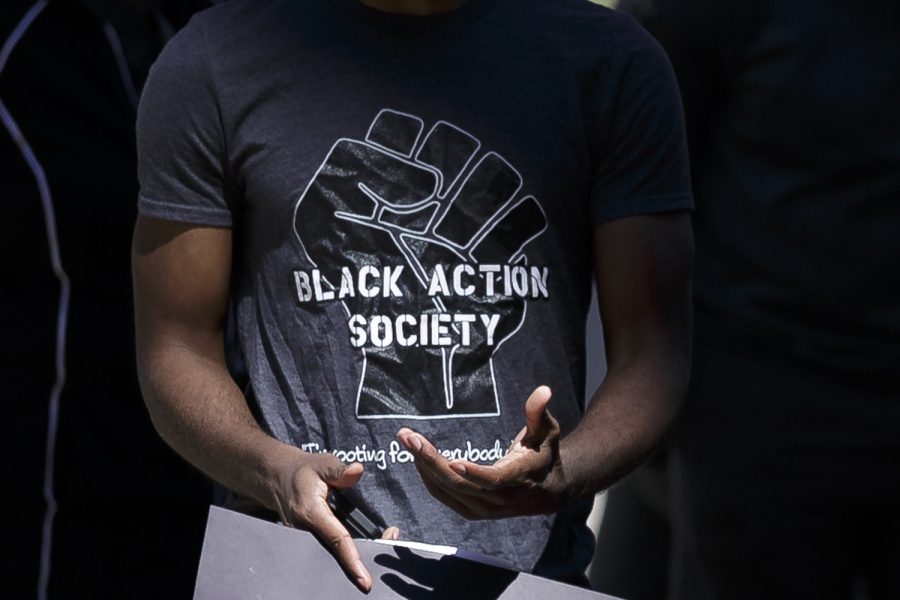‘We do not have the space to stop our protesting’: Students discuss mental health, activism burnout among the Black community
The Black Action Society and the National Pan-Hellenic Council sponsored a joint roundtable last Wednesday titled “Activism Burnout,” in an ongoing series of Mental Health Awareness month conversations and workshops.
October 18, 2021
In the midst of a pandemic and large protests against anti-Black violence, it can be difficult for Black students to navigate the area between their identity and mental health, according to Destiny Mann.
“I need to turn off my phone, but when I go downstairs and I see my little brother, who often goes on runs in our neighborhood, and then you see the Ahmaud Arbery case, it’s like I can’t do that,” Mann, a senior political science and Africana studies major, said. “I can’t just turn off my phone and take a step back, because it’s constant.”
Mann serves as the president of Pitt’s Black Action Society, the group which co-sponsored an event titled “Activism Burnout” last Wednesday with the National Pan-Hellenic Council. This event was part of an ongoing series of conversations and workshops for Mental Health Awareness Month. At the roundtable, student speakers Nadiyah Fisher and Selam Mekbeb-Gillett discussed the historical legacy of medical racism toward the Black community and the concept of activism burnout.
Fisher, a sister of the Mighty Mu chapter of Delta Sigma Theta and one of the lead panelists, said it would be impossible to address the whole history of medical racism. However, Fisher said this event should be seen as a springboard, something that other students can utilize to begin their own research and education.
Fisher, a junior majoring in neuroscience and psychology, noted a few specific examples to give a broad overview of the history, such as drapetomania and dysaethesia aethiopica. According to Fisher, during slavery, physicians would often diagnose enslaved people who attempted to rebel as “mentally ill.” When an enslaved person attempted to escape, they were diagnosed with drapetomania, and enslaved Black people were also categorized as “lazy” through the label of dysaethesia aethiopica, Fisher added.
“These are words you cannot even read because they are fake and have never been in the Diagnostic and Statistical Manual of Mental Disorders,” Fisher said. “These are just words made of prefixes and word roots to define ‘bad.’”
Even after formal slavery ended, during the Civil Rights Movement, Fisher said people would label members of the Black Panther Party and other members of the racial justice as having “political psychosis,” in order to connect a mental illness to political rebellion.
To this day, the current sociopolitical context has lasting mental health consequences for Black people, according to Mekbeb-Gillett, the executive secretary of the BAS. Racial justice scholars coined the term activism burnout in 2003.
“The feeling of hopelessness, going to college protests, reading the slew of social media,” Mekbeb-Gillett, a sophomore studying sociology and psychology, said. “Everyday you’re hearing about some other innocent Black body being murdered.”
However, there are ways to alleviate the intensity of activism burnout. Mekbeb-Gillett said creating vulnerable, safe spaces for Black people to talk about their feelings is just one way to prioritize self-care for Black students.
Activism burnout, and mental health in general, is a major area of concern among Black students at predominantly white institutions. Fisher said being constantly surrounded by students and faculty that do not look like her is an isolating experience.
“When you look so drastically different from those beside you, all of your actions are amplified,” Fisher said. “If you usually sit in the front, and you miss one day, you feel like everyone in the class knows you’re absent because you stand out so much.”
Due to prevailing anti-Black stereotypes such as the “angry Black woman,” Fisher said she finds herself analyzing her own actions, and trying to determine if her passion will be misconstrued as anger among her peers and professors.
“Why are my peers hesitant to defend me in public settings but agree to my points following my encounter?” Fisher said. “You start to question your stances and morals when you are constantly gaslit.”
Mann said on top of stereotypical norms and a general feeling of isolation, the constant brutality against Black people often seems to be ignored.
“That looks like my little brother, that could have been my father,” Mann said. “We normalize violence against Black people to the point where people don’t check in on their Black students.”
The constancy and intensity of racist oppression is overwhelming, and Mann said there is a real need for Black students to be able to decompress and have the resources to move forward.
One potential resource for racial trauma and activist burnout could be the University Counseling Center. According to Fisher, the UCC has made efforts to diversify and expand their resources, pointing to Dr. Darr’s meeting with Pitt Excel and Bridges to discuss the mental health of Black and brown people.
“But racial trauma is complex,” Fisher said. “I believe holding events that encourage raw and educational experiences geared towards Black people is the step in the right direction.”








